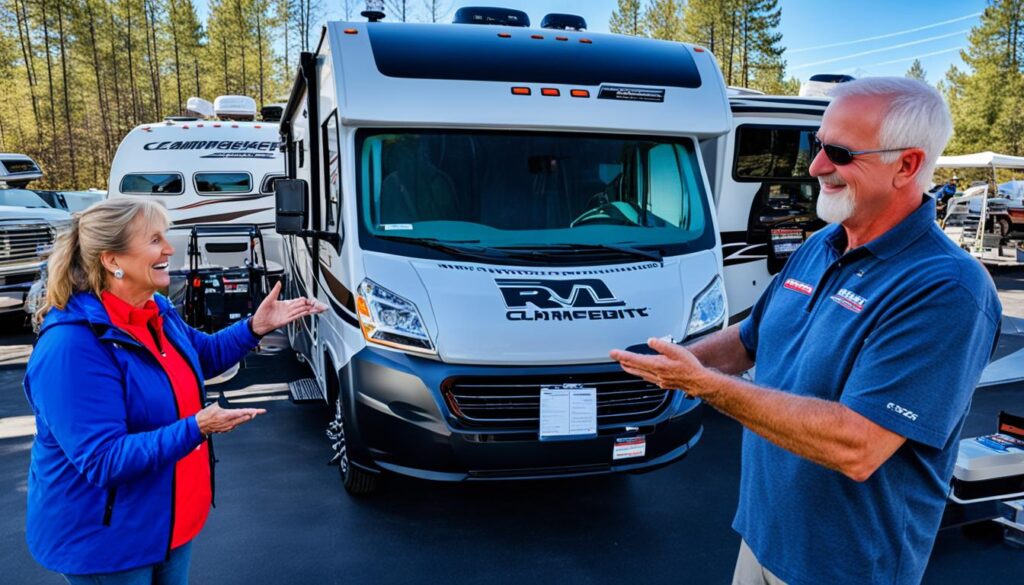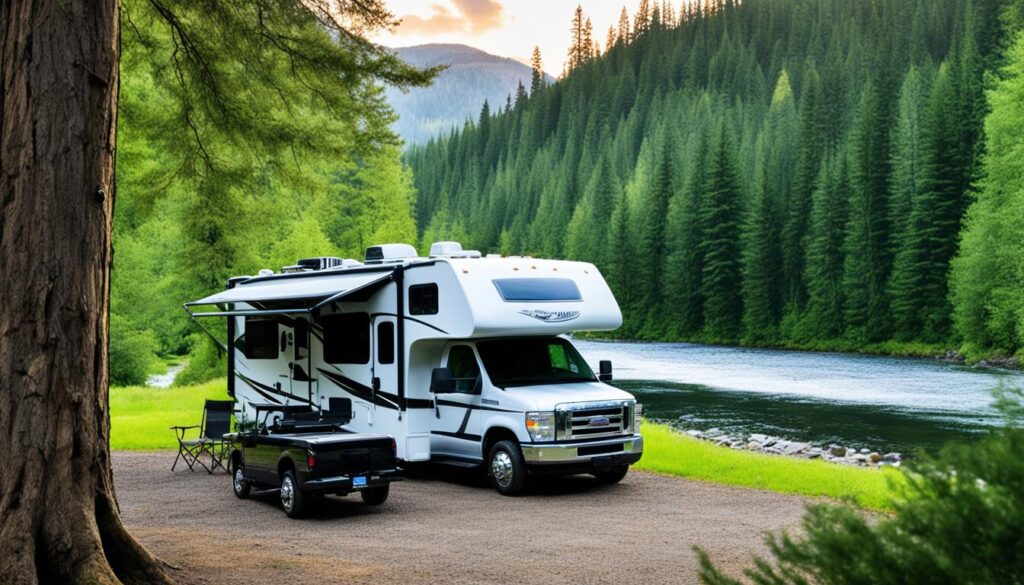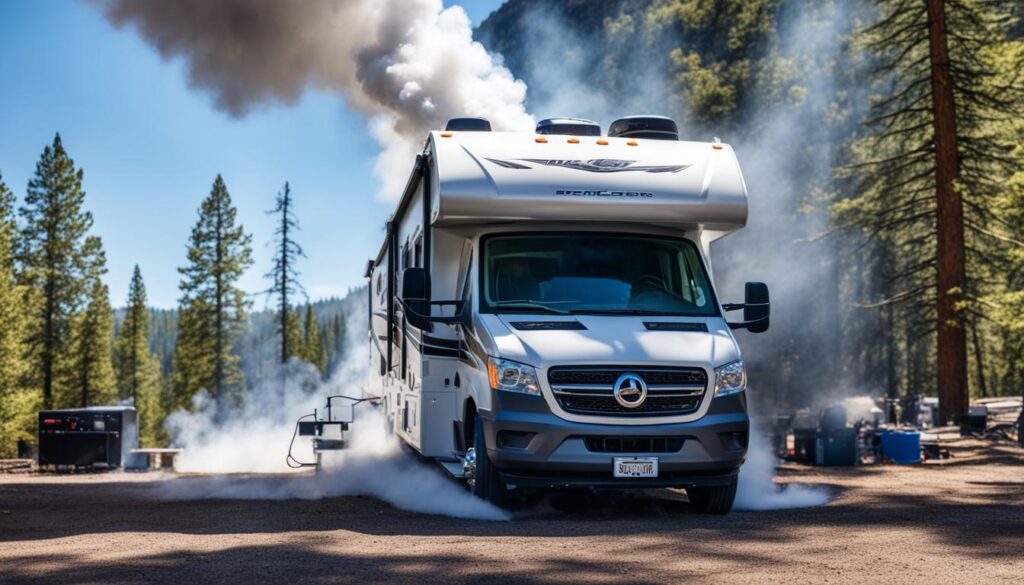RV generators are a crucial source of power for RV campers who enjoy boondocking or dry camping. But have you ever wondered how these generators actually work? How does an RV generator provide electricity to run all your appliances, charge your batteries, and keep you comfortable during your outdoor adventures?
In this comprehensive guide, I will take you through the inner workings of RV generators and explain their operation in detail. From the mechanics behind RV generator technology to understanding fuel consumption and maintenance, troubleshooting common issues, choosing the right generator for your needs, and exploring the benefits of inverter generators, this guide will provide all the information you need to become an RV generator expert.
Key Takeaways:
- Understanding the mechanics of RV generator technology
- Monitoring fuel consumption and performing regular maintenance
- Troubleshooting common RV generator issues
- Choosing the right generator for your RV’s power needs
- Exploring the benefits of inverter generators for RV use
Contents
- 1 Understanding RV Generator Technology
- 2 RV Generator Fuel Consumption and Maintenance
- 3 Troubleshooting RV Generator Issues
- 4 Choosing the Right RV Generator for Your Needs
- 5 The Benefits of Inverter Generators for RV Use
- 6 Factors to Consider When Purchasing an RV Generator
- 7 Tips for Using RV Generators and Final Thoughts
- 8 FAQ
- 9 Source Links
Understanding RV Generator Technology
RV generators play a crucial role in powering major appliances, charging batteries, and operating electrical devices in recreational vehicles (RVs). These generators utilize different fuel sources, such as gasoline, diesel, or propane, to generate the necessary power. But have you ever wondered how these devices function and convert fuel into electricity? Let’s delve deeper into the mechanics of RV generators and the process of power generation.
At the core of an RV generator is an engine that converts mechanical energy into electrical energy. When the engine is turned on, it drives an alternator, which is responsible for generating alternating current (AC) power. This AC power is indispensable for supplying electricity to various components and appliances in the RV.
The AC power generated by the alternator goes through a rectifier, a component that converts it into direct current (DC) power. The rectifier’s primary function is to charge the RV’s batteries, ensuring a continuous power supply even when the generator is not running.
However, since most appliances and devices in an RV require AC power, the DC power needs to be converted back. This conversion is achieved by an inverter, which transforms the DC power into AC power, making it suitable for use by the RV’s electrical system. Inverters are particularly essential for powering sensitive electronics, ensuring a steady and clean power supply.
It is worth noting that there are various types of RV generators available on the market, each offering its own unique benefits. Conventional generators are known for their robust power output and cost-effectiveness, making them suitable for larger RVs and heavy power demands. On the other hand, inverter generators are lauded for their fuel efficiency, quiet operation, and ability to produce high-quality power. They are an excellent choice for smaller RVs and campers that prioritize noise reduction and portability.
Harnessing the power of fuel, RV generators provide the electricity needed to operate appliances, charge batteries, and ensure a comfortable experience while on the road. By understanding the mechanics behind RV generator technology and power generation, RV enthusiasts can make informed decisions when selecting the right generator for their needs.
RV Generator Fuel Consumption and Maintenance
RV generators play a crucial role in powering various appliances and systems in your recreational vehicle, ensuring a comfortable and convenient experience while on the road. To optimize the performance and longevity of your RV generator, it is essential to understand its fuel consumption and maintenance requirements.
Fuel Consumption
The fuel consumption of an RV generator depends on several factors, including the generator’s size, load demand, and fuel efficiency. Larger generators generally consume more fuel as they produce higher power outputs. Similarly, running multiple appliances simultaneously will increase fuel consumption compared to operating a few essential appliances.
It is important to monitor fuel levels and ensure an adequate supply for your desired runtime. Running out of fuel can cause the generator to shut down abruptly and potentially damage connected devices. By understanding your generator’s fuel consumption rate, you can plan your refueling schedule accordingly.
| Generator Size | Runtime per Gallon of Fuel |
|---|---|
| 3000-watt generator | 8-10 hours |
| 5000-watt generator | 5-7 hours |
| 7000-watt generator | 3-5 hours |
These figures are approximate and can vary depending on the specific generator model, load demand, and other environmental factors. It is always recommended to consult the manufacturer’s documentation for accurate fuel consumption information.
Maintenance
Regular maintenance is crucial to keep your RV generator in optimal working condition and prevent costly repairs or breakdowns. Here are some essential maintenance tasks:
- Oil Check and Change: Regularly check the oil level and quality of your generator as specified in the manufacturer’s guidelines. Change the oil at regular intervals or as recommended by the manufacturer to ensure proper lubrication and engine performance.
- Air Filter Inspection and Cleaning: The air filter prevents dust and debris from entering the generator’s engine, ensuring clean airflow. Inspect the air filter regularly and clean or replace it as needed to maintain efficient engine operation.
- Spark Plug Inspection: The spark plug ignites the fuel-air mixture in the engine. Periodically inspect the spark plug for signs of damage or carbon buildup. Clean or replace it as necessary to ensure proper combustion.
- Fuel and Coolant Level Check: Regularly check the fuel and coolant levels in your generator. Ensure that there are no leaks or abnormalities that could affect the generator’s performance or cause potential damage.
While some routine maintenance tasks can be performed by RV owners, it is highly recommended to have your generator serviced by a qualified technician. They have the expertise to identify potential issues, perform in-depth inspections, and address any underlying problems, ensuring the optimal performance and longevity of your RV generator.
By understanding the fuel consumption and maintenance requirements of your RV generator, you can enjoy reliable power wherever your adventures take you.
Troubleshooting RV Generator Issues
RV generators are reliable power sources for your RV, but they can occasionally encounter issues that affect their performance. By troubleshooting these problems, you can optimize your RV generator’s performance and ensure a smooth camping experience. Here are some common issues you may encounter:
- Starting issues: If your generator has trouble starting, check the fuel level and ensure that the fuel valve is open. Additionally, check the battery connections and charge level if your generator has an electric start feature.
- Low power output: If you notice a decrease in power output, check the load demand and make sure you are not overloading the generator. Inspect the fuel and air filters for any blockages that may be restricting airflow.
- Strange noises: Unusual noises can indicate mechanical issues within the generator. Inspect the generator for loose components, damaged belts, or worn-out bearings. If the noise persists, consult a qualified technician for further inspection.
- Fuel or oil leaks: Leaks can prevent the generator from operating efficiently and may pose safety risks. Check for any signs of fuel or oil leaks and address them immediately. Ensure that the fuel and oil lines are properly connected and tightened.
When troubleshooting RV generator issues, it’s important to follow the manufacturer’s guidelines and perform regular maintenance. This includes checking the fuel and oil levels, inspecting the air filter, and ensuring proper connections. Regular maintenance not only helps optimize performance but also prevents potential issues from arising.
| Issue | Troubleshooting Steps |
|---|---|
| Starting issues | Check fuel level and valve, inspect battery connections and charge level |
| Low power output | Check load demand, inspect fuel and air filters for blockages |
| Strange noises | Inspect for loose components, damaged belts, or worn-out bearings |
| Fuel or oil leaks | Check for signs of leaks, ensure proper fuel and oil line connections |
Choosing the Right RV Generator for Your Needs
When it comes to selecting an RV generator, it’s crucial to consider the specific power requirements of your RV. Factors such as the electrical system, appliances used, and the number of air conditioning units will determine the size of the generator you need. Let’s explore the different aspects to keep in mind:
RV Electrical System
Before choosing a generator, it’s essential to understand the electrical system of your RV. Most RVs are equipped with either a 30-amp or 50-amp electrical system. This will help determine the size of the generator required.
30-Amp RV Generator
If your RV has a 30-amp electrical system, a generator with a wattage ranging between 2,000 to 2,500 watts should be sufficient to power your RV. This generator can handle most appliances and basic electrical needs.
50-Amp RV Generator
For RVs with a 50-amp electrical system, a generator with a higher wattage is recommended. A range of 4,000 to 5,500 watts should provide enough power to run multiple air conditioning units and other high-demand appliances.
It’s worth noting that if you require even more power, you can parallel two portable generators to increase your power output.
Considerations Beyond Wattage
While wattage is an essential consideration, there are other factors to keep in mind when choosing an RV generator. Noise levels, fuel efficiency, and additional features like electric start or remote control are worth considering based on your personal preferences and needs.
Ultimately, choosing the right generator for your RV requires assessing your power requirements and carefully considering the aspects that align with your specific needs and preferences.

The Benefits of Inverter Generators for RV Use
Inverter generators are a game-changer when it comes to powering your RV. Not only do they provide reliable electricity on the go, but they also offer several advantages that make them highly desirable for RV enthusiasts.
Fuel Efficiency and Longer Runtimes
An inverter generator is specifically designed to optimize fuel efficiency. Unlike conventional generators that run at a fixed speed, inverter generators adjust their engine speed based on the power demand. This feature ensures that fuel is consumed only as needed, resulting in longer runtimes and reduced fuel consumption. With an inverter generator, you can enjoy more time off-grid without worrying about running out of fuel.
Quiet Operation
No one wants a noisy generator disturbing the peace and tranquility of their camping experience. Inverter generators are renowned for their whisper-quiet operation. The advanced technology used in these generators helps minimize noise levels, making them the perfect choice for those who value peace and quiet. In fact, inverter generators are far quieter compared to traditional generators, with some models operating at noise levels as low as 48 to 57 decibels.
Clean and Stable Power
When it comes to sensitive electronics and devices, such as smartphones, tablets, or laptops, having clean and stable power is crucial. Inverter generators produce a type of electrical current known as “clean power” that is safe and reliable for running sensitive electronics. The power produced by inverter generators is free from voltage fluctuations and harmonics, ensuring your devices operate smoothly and without interruptions.
Additional Features and Portability
Inverter generators often come with a range of additional features that enhance their functionality and convenience. Some models are equipped with built-in CO detectors to ensure your safety. Others offer automatic shut-off capabilities, allowing the generator to turn off automatically when the load is low, thereby conserving fuel. Additionally, inverter generators are compact and lightweight, making them highly portable and easy to transport.
Wide Range of Options
One of the best things about inverter generators is the wide range of options available on the market. From reputable brands like Honda, Yamaha, and Generac, there are numerous models to choose from. While the Honda EU2200i is often considered one of the quietest generators for RV use, there are plenty of other excellent options to suit individual preferences and priorities. Whether it’s power output, fuel efficiency, additional features, or budget constraints, you can find an inverter generator that ticks all the boxes.
Overall, inverter generators are a top choice for RV enthusiasts due to their fuel efficiency, quiet operation, clean power output, and portability. If you’re looking for a reliable and convenient power source for your RV, consider investing in an inverter generator to enhance your camping experience.
Factors to Consider When Purchasing an RV Generator
When shopping for an RV generator, there are several important factors to consider to ensure you choose the right one for your needs. These factors include:
- Price: Determine your budget and look for generators within that price range.
- Noise Level: Consider how important quiet operation is to you and choose a generator with a low noise level.
- Fuel Efficiency: Look for generators that offer good fuel efficiency to maximize runtime.
- Output Capacity: Determine the power needs of your RV and select a generator with an adequate output capacity.
- Portability: Consider the weight and size of the generator, especially if you plan to move it frequently.
- Additional Features: Some generators may offer features such as electric start, automatic shutdown, or parallel capability. Decide which features are important to you.
There are several popular RV generator options on the market that provide a combination of reliability, performance, and value. These include:
- Honda EU3000i
- Honda EU2200i
- Yamaha EF2000iSv2
- Generac GP3000i
- WEN 56203i
- Predator 3500
Each generator on this list has its own standout features and price range, so you can choose the one that best suits your specific requirements. It’s important to evaluate these factors and select a generator that meets your power needs, budget, noise level preferences, and other considerations.

Tips for Using RV Generators and Final Thoughts
When using RV generators, it is crucial to prioritize safety precautions to ensure a smooth and hassle-free camping experience. Properly positioning the generator away from the RV is essential to minimize the risk of fumes and noise disturbances. Additionally, installing a carbon monoxide detector will help safeguard against potential dangers. Remember to comply with noise restrictions and quiet hours in campgrounds, making generators with lower decibel ratings a favorable choice.
Fuel efficiency is another crucial factor to consider when selecting an RV generator. By opting for a fuel-efficient model, you can prolong the generator’s runtime and decrease the frequency of refueling. Being mindful of power usage and avoiding overloading the generator are additional steps that can help maximize fuel efficiency and overall performance.
Regular maintenance is key to keeping your RV generator in top-notch condition. It is highly recommended to follow the manufacturer’s guidelines for maintenance tasks, such as checking and changing the oil, inspecting and cleaning the air filter, and ensuring proper fuel and coolant levels. By adhering to a regular servicing schedule and seeking assistance from a qualified technician, you can catch any potential issues before they escalate and ensure that your generator operates optimally.
Ultimately, choosing the right generator for your RV is the cornerstone of a satisfying camping experience. By considering factors such as safety precautions, fuel efficiency, and power requirements, you can select a reliable generator that meets your needs. With a well-maintained and thoughtfully chosen RV generator, you can enjoy the convenience and peace of mind that comes with having a reliable power source wherever your adventures take you.
FAQ
How does an RV generator work?
RV generators work by converting mechanical energy from the engine into electrical energy. The engine drives an alternator, which produces AC power. This AC power is then converted to DC power to charge the RV’s batteries and supply electricity to appliances and devices through an inverter.
How does a recreational vehicle generator function?
A recreational vehicle generator functions by using fuel (gasoline, diesel, or propane) to generate power for running appliances, charging batteries, and operating electrical devices in the RV. The generator’s engine drives an alternator, which produces AC power that is converted to DC power for battery charging and inverted back to AC power for appliance use.
How does RV generator power generation work?
RV generator power generation works by converting mechanical energy from the generator’s engine into electrical energy. The alternator produces AC power, which is converted to DC power for battery charging and inverted back to AC power for use by appliances and devices in the RV.
How does an RV generator work in terms of mechanics?
In terms of mechanics, an RV generator operates similarly to other gas-powered equipment. The engine drives an alternator, which produces electrical energy. This energy is converted, inverted, and regulated to supply power to the RV’s electrical system, appliances, and devices.
How does an RV generator consume fuel?
RV generators consume fuel (gasoline, diesel, or propane) during operation. The fuel is burned in the generator’s engine, where it is converted into mechanical energy to drive the alternator and produce electrical energy.
How much fuel does an RV generator consume?
The fuel consumption rate of an RV generator depends on factors such as the generator’s size, load demand, and fuel efficiency. Monitoring the generator’s fuel levels and having enough fuel for the desired runtime is necessary to ensure continuous power supply.
What maintenance is required for an RV generator?
Regular maintenance is necessary to keep an RV generator in good working condition. This includes checking and changing the oil, inspecting and cleaning the air filter, inspecting the spark plug, and ensuring proper fuel and coolant levels. Regular servicing by a qualified technician is also recommended.
How do I troubleshoot RV generator issues?
Troubleshooting RV generator issues may involve checking the fuel and oil levels, inspecting the air filter, checking the spark plug, verifying proper connections, and referring to the manufacturer’s guidelines. Regular maintenance and adherence to recommended practices can help optimize performance and prevent potential issues.
What size generator do I need for my RV?
The size of the generator depends on factors such as the RV’s electrical system, appliances used, and the number of air conditioning units. As a general guideline, a 2,000-2,500 watt generator is suitable for a 30-amp RV, while a 4,000-5,500 watt generator is recommended for a 50-amp RV.
What are the benefits of using inverter generators for RVs?
Inverter generators offer several advantages for RV use. They are known for their fuel efficiency, quieter operation, and ability to produce clean power suitable for sensitive electronics. Inverter generators often have additional features such as CO detectors and automatic shut-off capabilities.
What factors should I consider when purchasing an RV generator?
When purchasing an RV generator, factors to consider include price, noise level, fuel efficiency, output capacity, portability, and additional features. Popular RV generator options include the Honda EU3000i, Honda EU2200i, Yamaha EF2000iSv2, Generac GP3000i, WEN 56203i, and Predator 3500.
What are some tips for using RV generators?
When using RV generators, it is important to observe safety precautions, properly position the generator away from the RV, install a carbon monoxide detector, and consider noise restrictions. Monitoring power usage, avoiding overloading, and performing regular maintenance are also essential for optimizing performance.






